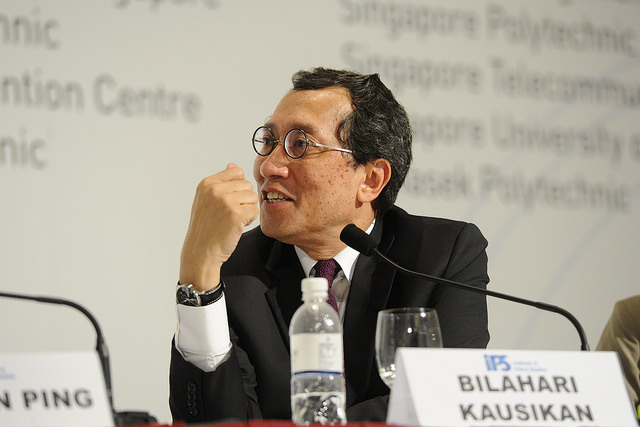He is the probably the most famous diplomat in Singapore today.
Yes, we are talking about the undiplomatic diplomat, the troll of European Ambassadors, the thorn in Malaysian opposition politicians' sides - Ambassador-at-Large Bilahari Kausikan.
The MFA policy advisor will take over Banyan Tree Holdings boss and public intellectual Ho Kwon Ping as the Institute of Policy Studies’ second S R Nathan Fellow.
As the think tank's Fellow, Ambassador Bilahari will deliver five public lectures, “Dealing with an Ambiguous World” over the next six months.
In other words, expect bruised egos, crying students and embarrassed public intellectuals if they were to pose a smart aleck question without doing their homework.
In fact, the registration for his first public lecture is already closed due to the overwhelming response.
Either Singaporeans are suckers for punishment or Singaporeans like to collectively enjoy a sense of schadenfreude.
Anyway, the former Ministry of Foreign Affairs (MFA) Permanent Secretary is off to a good start, judging from the type of replies he gave to the IPS in their first interview.
1. On the key life experiences that have made him who he is...
"I always find such questions somewhat strange.
The most important life experience for everybody must obviously be having been born since we are who we are largely – though of course not wholly — by virtue of what we inherit from our parents..."
2. On his civil service stint...
"I had never intended to join the civil service.
I once wanted to be an academic and in fact got a scholarship from the then-University of Singapore to do a PhD in international relations at Columbia University. I had passed my qualifying examinations and was in the process of writing my dissertation when struck by an epiphany: the academic study of international relations is largely nonsense so why waste time?
I quit and returned home. In retrospect, it was a close shave both for me and the university."
3. On the founding fathers of modern Singapore:
"[M]y generation was privileged to work with the three men who shaped the fundamentals of our foreign policy: Mr Lee Kuan Yew, Dr Goh Keng Swee and Mr S Rajaratnam."
"Of course we worked for them in very humble capacities — as note-takers and bag carriers — but still were privileged to absorb almost by osmosis something of their values and the basic principles that guided their actions and remain relevant to our foreign policy to this day."
4. On becoming a "prolific commentator" after retiring from the public sector...
"I would not call myself prolific — I am a world-class procrastinator and find writing painful, particularly the first sentence.
But I have always been irritated by the poor quality of public commentary on international affairs in Singapore. Too many local commentators start from premises, often unstated or unconscious, that are irrelevant to our situation or naïve. Yet Singapore cannot insulate itself from international developments and Singaporeans need to understand the realities that we cannot avoid.
To live in a state of happy delusion is dangerous. It seems to me that too many of our commentators on international affairs are afraid to state the obvious for fear of being considered shallow or else they tend to paint an entirely unrealistic picture of things because they want to be considered nice guys. Small states have limited options which usually are obvious. Yet the obvious is sometimes not so obvious because obfuscation and wishful thinking are unfortunately all too often characteristics of discussions on international affairs.
And the obvious options are not necessarily nice. So I occasionally rouse myself from my customary state of torpor to state what is obvious or unpleasant but necessary. With what effect I do not know – probably not very much — but it at least makes me feel better."
5. On what readers can expect from his series of IPS-Nathan Lectures
"I think the world is entering a phase of more than usual uncertainty.
I will try to explain why I think this is so and then examine some specific aspects, such as US-China relations, ASEAN and Southeast Asia and conclude the last lecture by considering how prepared we are for these developments."
6. On his considerations before writing
"I have long ceased to care very much about what people other than my family and friends think about me. So when I write I only think about what I want to say and how to get it across as clearly as possible."
7. On his favorite musician
"Deep Purple. I am of the view — perhaps 'prejudice' is a more accurate term — that with very, very few exceptions, most popular music after circa 1978 is not worth listening to.
But then I have been accused, probably accurately, of being tone deaf so what do I know?"
You can read the full interview, "Defining Bilahari Kausikan" here.
Top photo from IPS's Flickr page.
If you like what you read, follow us on Facebook and Twitter to get the latest updates.
If you like what you read, follow us on Facebook, Instagram, Twitter and Telegram to get the latest updates.

